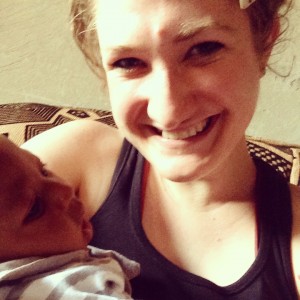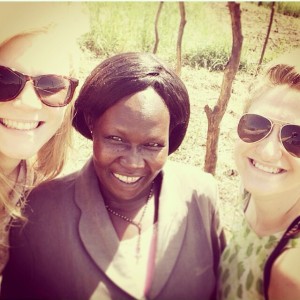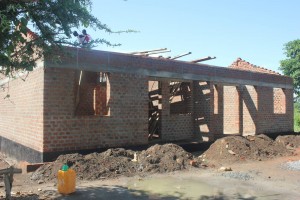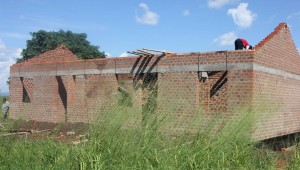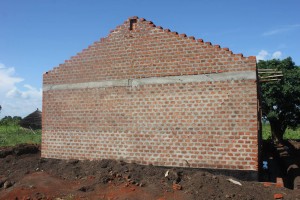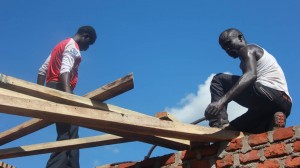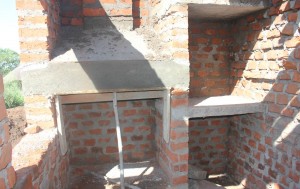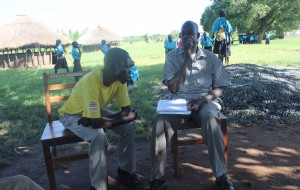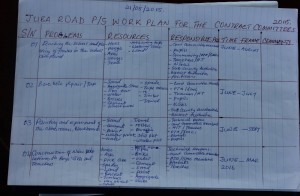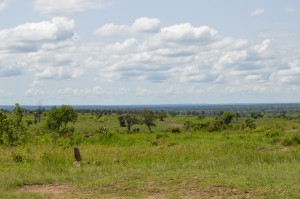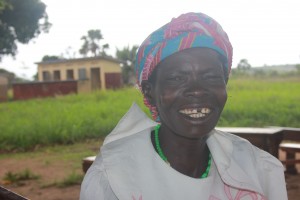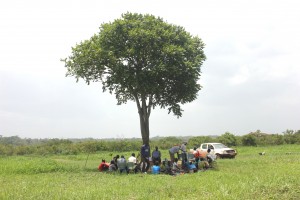The day of a volunteer in Uganda: Jade
June 5, 2015I have been in Gulu, Uganda for almost four months now as a Communications and Fundraising volunteer.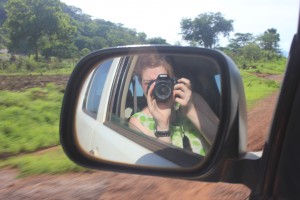 When I first arrived, the time seemed to pass in slow motion as I adjusted to my surroundings and new home, but now that I have found my grove, time has spun wildly out of control! As supporters, you have probably seen and read the results of the comms team’s work, but join me behind the scenes, for a typical day in the office…
When I first arrived, the time seemed to pass in slow motion as I adjusted to my surroundings and new home, but now that I have found my grove, time has spun wildly out of control! As supporters, you have probably seen and read the results of the comms team’s work, but join me behind the scenes, for a typical day in the office…
8.30am: The doors are now open to the Gulu office! My commute time is practically nil, as I live on the same compound as the office. I walk over, mug of fresh coffee in one hand, red laptop in another, and my bag which essentially contains a notebook, scrap paper, and pens which don’t work.
A friendly open-plan office, I spend several minutes catching up with staff, discussing important events of the evening (ie: power cuts!) and scheduling future field visits, before knuckling down to work.
8.40am: First things, first. Emails. Due to the two hour time difference between Uganda and the UK, I will often receive emails from the previous day which I have not yet read and so, I get replying and action any requests or tasks. I also check African Revival’s Twitter account, managed by the wonderful Emily to re-tweet African Revival, and reply to messages.
9.00am: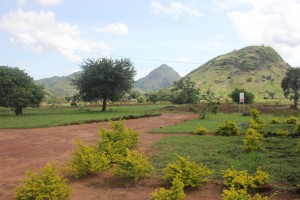 I spend a good few days each month in the field, gathering photos, interviews, and case-studies. But the real work starts when I am back in the office. One of the first things I do when I return to Gulu is sorting and editing photos, before sharing them with the UK office so that the communications team have a constant supply of fresh new pictures to use.
I spend a good few days each month in the field, gathering photos, interviews, and case-studies. But the real work starts when I am back in the office. One of the first things I do when I return to Gulu is sorting and editing photos, before sharing them with the UK office so that the communications team have a constant supply of fresh new pictures to use.
10.00am: Next, I pop in my head-phones and begin the painstaking task of transcribing recorded interviews, and writing up the notes I have scribbled in the field. Once I have made sense of my appalling hand-writing, I can get to work using the content for whatever I am working on: a donor report, a news update for the website, or AR’s newsletter.
12.00am: 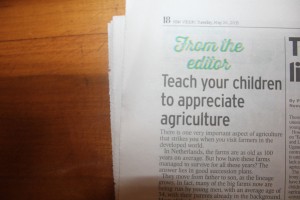 By this time, the newspapers have usually been delivered to the office. We are always keen to stay abreast of relevant national and local news, and current affairs- particularly articles about education, gender issues, agriculture, literacy and sanitation. If I come across a good article, I will send it to the UK team, who will work it into the social media plan. Funding opportunities are also often advertised in newspapers, so I keep an eye out for any funding calls, which African Revival may be qualified to apply for.
By this time, the newspapers have usually been delivered to the office. We are always keen to stay abreast of relevant national and local news, and current affairs- particularly articles about education, gender issues, agriculture, literacy and sanitation. If I come across a good article, I will send it to the UK team, who will work it into the social media plan. Funding opportunities are also often advertised in newspapers, so I keep an eye out for any funding calls, which African Revival may be qualified to apply for.
12.20am: Later on in the morning, I get cracking on with some ad-hoc tasks which may have arisen, like doing research for funding proposals. Sometimes, it is hard not to get distracted when the findings are really interesting, and I often get carried with googling!
1pm: I normally skip breakfast, so by around 1pm, I am ravenous and ready for some lunch. My go-to dish? I whip up a home-made flatbread and eat it warm with an avocado and tomato salad. Have I mentioned that the avocadoes here are absolutely delicious?! If I am working in the field, the team will stop at a local eating spot once we have finished our work. My regular choice is beans and rice, simple but satisfying.
2pm: The afternoon is usually spent writing, or in the field. At the moment, I am working on writing up profiles of the schools we are working with, but confession: I have put this on the back-burner lately as more-pressing jobs have arisen.
If I am conducting a field visit, it is usually a full-day event, particularly as several hours are spent travelling; this is because we work where the need is greatest, and that is often within rural communities. If I have several days worth of work to do in one area, I sometimes stay overnight at a local hotel to make the most of my time. The first time I did this, I was a little apprehensive but now, I find staying away from Gulu on the odd occasion very peaceful, and quite relaxing!
During visits to our projects and partner schools, I mill around capturing activities and interviewing pupils, teachers, and parents.
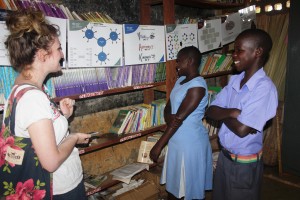 I make sure I ask lots of questions, so that we have plenty of content which we can share with you all! As I have been here for several months, I am beginning to build up a good relationship with our stakeholders, and we greet each other warmly; I particularly love meeting the same pupils, and watching the children perform songs and dances. I have been known to get in on the action, and start singing and dancing along- very poorly I might add!
I make sure I ask lots of questions, so that we have plenty of content which we can share with you all! As I have been here for several months, I am beginning to build up a good relationship with our stakeholders, and we greet each other warmly; I particularly love meeting the same pupils, and watching the children perform songs and dances. I have been known to get in on the action, and start singing and dancing along- very poorly I might add!
5.00pm- 6.00pm: By early evening, it’s time to wrap up work. If I have been out and about, I normally arrive back at the office dusty and tired. However, you know the kind of aches which are symptomatic of a productive day? That kind of tiredness always feels good. On the way home, I am normally quiet, as I process the things I have seen, and the things I heard. I ponder the people I have met, as I take out my camera and start looking back over the photos.
Most days end this way, but some days are also tinged with some sadness. Although I was raised in some of world’s poorest countries, I am still sometimes caught off-guard when I visit particularly poor or vulnerable communities. However, those moments also serve as a poignant reminder of why, as an organization, everyone works so hard to make African Revival’s programmes a success.
Once the working day is over, fellow volunteer Alex, and I head back to our home, pop on the kettle, and normally chat about our day before making plans for the evening ahead!
Posted in News | Leave a commentSchool Gardens Update: Meet Christine!
June 4, 2015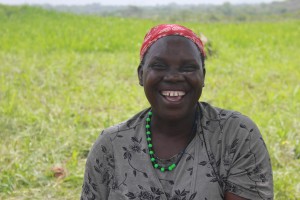 Christine Amono is one of the school demonstration garden group members of Teddi Primary School, located in the Pabbo sub-country of Amuru. Christine has four children, all of whom attend the school- two are in Primary 5, and her youngest are in P1. Christine is an active and dedicated member of the local community; in fact, she has been the Vice Chairperson of Teddi’s School Management Committee since 2002. Christine tells us: “I am the chairperson because of the value that people saw in me so they felt that I would be the right person to help with the management of the school. This is a voluntary position that does not pay whatsoever, and they just came up as a community initiative because the other schools that are surrounding this place are very far”.
Christine Amono is one of the school demonstration garden group members of Teddi Primary School, located in the Pabbo sub-country of Amuru. Christine has four children, all of whom attend the school- two are in Primary 5, and her youngest are in P1. Christine is an active and dedicated member of the local community; in fact, she has been the Vice Chairperson of Teddi’s School Management Committee since 2002. Christine tells us: “I am the chairperson because of the value that people saw in me so they felt that I would be the right person to help with the management of the school. This is a voluntary position that does not pay whatsoever, and they just came up as a community initiative because the other schools that are surrounding this place are very far”.
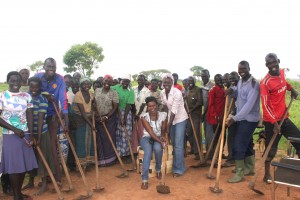 It was Christine’s commitment to improve the school which motivated her to join the school garden group: “The farmers group is very good because I feel that if I am part of this school garden group then it will help in the development of our school being a community school without any other external support. I think it’s going to develop the school in a way that when they do the funding, sell the proceeds, a percentage of the proceeds from the farming go to the school to go for the needs that the school may have such as scholastic materials and books.”
It was Christine’s commitment to improve the school which motivated her to join the school garden group: “The farmers group is very good because I feel that if I am part of this school garden group then it will help in the development of our school being a community school without any other external support. I think it’s going to develop the school in a way that when they do the funding, sell the proceeds, a percentage of the proceeds from the farming go to the school to go for the needs that the school may have such as scholastic materials and books.”
Alongside working to improve the local school, Christine – like 90% of adults in Amuru – is a full-time farmer, and sells her produce to send her children to school. Christine hopes to replicate the techniques being used in the school garden at home to improve her own yields: “when I get back home, the same skills that I acquire from the group will help me in my home. I’ll take them back to my home.”
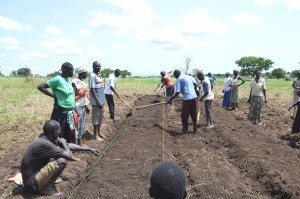 An important livelihood strategy in this region, Christine is also keen to pass on her farming knowledge to her children: “I think it is good for the children to learn agriculture skills because it improves on the quality of the skills that they have, agriculture being the main thing that they do at home. When they go back home they can still enrich what they already have at home through learning agriculture.” As part of the School Demonstration Gardens programme, the livelihoods teams will also be shortly launching student garden clubs, which Christine’s older children will have the opportunity to join, to learn new agricultural skills.
An important livelihood strategy in this region, Christine is also keen to pass on her farming knowledge to her children: “I think it is good for the children to learn agriculture skills because it improves on the quality of the skills that they have, agriculture being the main thing that they do at home. When they go back home they can still enrich what they already have at home through learning agriculture.” As part of the School Demonstration Gardens programme, the livelihoods teams will also be shortly launching student garden clubs, which Christine’s older children will have the opportunity to join, to learn new agricultural skills.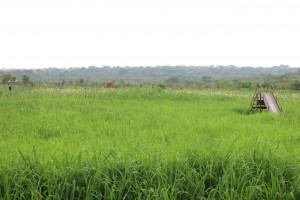
With the profits generated from the school garden, Christine is hoping to save a portion to help pay for her children’s school fees, and then invest the rest through buying a young goat.
Our hope is that through the school garden project, Christine will be able to achieve these goals, and will one day have many goats running around her property!
Posted in News | Leave a commentJuba Road Teacher House – Photo Update
June 2, 2015We are now entering Week 7 of construction of teacher accommodation at our partner school at Juba Road, Northern Uganda. The superstructure has reached the wall plate level with the roofing materials ordered and on-site we have timber for the roof structure. The roofing sheets will be delivered over the coming weekend
Fabrication of the doors and windows is at the final stages in the workshop, and all will be delivered next week, when the rendering and plaster works are set to begin. Everything is on schedule and the project should be complete within the targeted 12 weeks.
The committee established by the school comprised of 7 Seven members who serves both as the contract committee and the maintenance of the school property
In a recent meeting between African Revival and the school, it was agreed that the next steps will involve;
- Identifying the current school maintenance concerns
- Ranking any outstanding issues in order of priority
- Suggesting possible workable solutions within the budget
- Setting a work plan to achieve those solutions
- Presenting the solutions to the School Management Committee (SMC) and Parent Teacher Association (PTA)
In order to encourage the school and its local community to really take charge of the project, the SMC and PTA have also agree to check on the progress of the construction works alternately, from here on in. In the future, they will develop a workable maintenance schedule to keep the new build in good condition for future generations of teachers at the school.
Posted in News | Leave a commentSchool Demonstration Update: Meet Teresa
June 2, 2015In April, we launched our new School Demonstration Gardens project in northern Uganda’s Amuru district, with funding from the Bestseller Fund. The Amuru district was at the heart of the Lord’s Resistance Army war that devastated Northern Uganda for over two decades, and today, 63% of the district’s population still live in poverty. However, through the course of the school demonstration garden project in Amuru, we will empower 700 parents and 3,500 primary school children through agricultural activities.
African Revival has been working with fifteen schools to help improve crop production, and increase food security which will ultimately help boost families’ profits. Our livelihoods team has been busy establishing school gardens in our partner schools across the Amuru district, and mobilizing motivated community members to join the garden groups. One parent who has joined a garden group is Teresa, a farmer, whose children attend Teddi Primary School. We spoke to Teresa, to find out how this programme is going to help support her family.
Hi, Teresa. How many children do you have at Teddi Primary School?
I have 3 children in the school. Ronald is 12, Brian is 10, and Francis is 6 years old.
What was your motivation for joining the school gardens group?
I liked the fact that through this group, I can access loans which I can use to help pay school fees. Also, being in a group, you don’t just come and work, you also share experiences and problems with one another- and then you can find solutions to your worries together.
How are you hoping that being part of this group will benefit you and your family?
If I have problems paying school fees, I will have access to the loan scheme. Also, with the good agricultural knowledge that I am gaining, I can replicate what we do in the school garden at home, and it will help my overall profits.
Is coming to school more often helping you keep track of your children’s progress at school?
Yes, I do. I only used to come to the school once a week- now I am here twice a week. I even visit the classrooms too, now.
How would you like to use your portion of the profits generated from the garden?
I want to use my profits for my children’s school fees and also to invest. So, I want to buy more seeds for my own garden.
Posted in News | Leave a commentVolunteer Interview – Ayotunde
June 1, 2015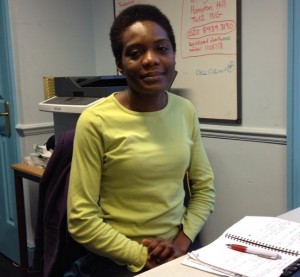 Today we meet Ayotunde, one of our Trust and Foundation volunteers in the UK office. Before volunteering with us, Ayotunde volunteered for Street Kids International UK and worked for the NHS. She has interests in international health and development, a master’s degree in International Studies and Diplomacy from SOAS, and a strong passion for supporting African-led development and advancing the quality of life for those living in developing countries.
Today we meet Ayotunde, one of our Trust and Foundation volunteers in the UK office. Before volunteering with us, Ayotunde volunteered for Street Kids International UK and worked for the NHS. She has interests in international health and development, a master’s degree in International Studies and Diplomacy from SOAS, and a strong passion for supporting African-led development and advancing the quality of life for those living in developing countries.
How long have you been volunteering with African Revival?
I have been volunteering since January 2015.
Have you ever volunteered before?
I have volunteered with an international development charity focused on youth empowerment.
What made you get involved with African Revival originally?
African Revival supports Africa development. Africa is my heritage and I have a strong passion for supporting African-led development. I consider African Revival an appropriate place to pursue my career in international development and contribute to an Africa that is now readily celebrated as ‘bright’, ‘emerging’, ‘rising’ and ‘aspiring’.The days in which Africa was seen as ‘The Hopeless Continent’ seem long gone.
What kind of activities have you been involved in at AR?
My main activities are research, trust fundraising and assisting with the annual ball. I undertook research on thematic issues for the Africa Revival’s School Garden Project such as farming, agriculture and girls’ education in Uganda and Zambia.I also assisted the Fundraising & Communications team in researching statistics, facts and stories for the website. I conducted searches on trust and foundation funding sources to identify potential funders. I also wrote and submitted grants proposals to trusts to fund projects in Uganda and Zambia. I have also researched celebrities of British and Zambian heritage and wrote to theatres in London in order to support the fundraising ball.
What’s the best thing about working with AR?
African Revival is a good example of a friendly working environment as well as working in harmony. This makes me feel good and appreciated. More importantly, I have become more informed about international development. I became aware about the UN Millennium goals and its relevance to international development when the fundraising team got together to brainstorm on amending a concept note for UK Aid Match funding submitted to the UK Department for International Development.
What’s the most challenging thing about working with AR?
This is the first time I have worked in a place that is far from the city. It is a long way to travel and at times, there are train delays/disruption along the route. However, the long distance is like an adventure along the Teddington riverside and I don’t feel bored when travelling to work. There are times in life that one has to step out of one’s comfort zone to get the best for growth and progress, especially in one’s career. In retrospect, I witnessed the benefits of stepping out of my comfort zone.
Posted in News | Leave a comment

